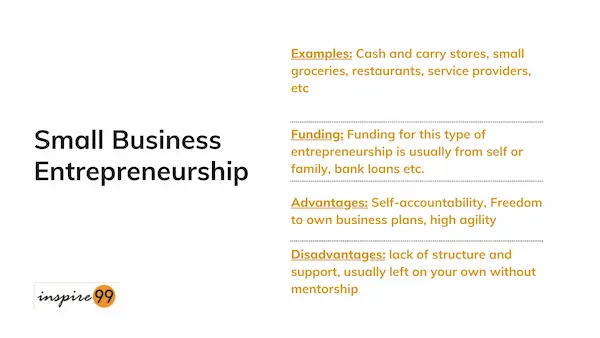Small business entrepreneurship: I love small businesses. They’re mostly generated out of passion. I feel they form a fabric of society, and they have a very beautiful way of creating a culture around themselves. As much as I love the area of entrepreneurship and startups, I feel that they have a corporate element to them. Small businesses, however, have their character and ability to remain the same because of the types of ownership they have the characteristic of a founder flows through Small Business Entrepreneurship and tends to remain the same. Sometimes this is great news, and takes a fantastic space to work in, in other cases it does turn out to be quite a pain depending on the type of founder, you’re stuck with.
A small business is inherently different from a startup/scale-up venture. They differ in purpose, ownership, and focus. Some of these differences are fundamental to the way they operate and the goals that they try to accomplish. I like small businesses as they represent vast majority of the entrepreneurial ventures. Most entrepreneurs are small businesses and represent people with enterprising skills. Most small businesses are restricted by their size, revenue opportunities and scale at which they can grow.
Table of Contents
What is a Small business entrepreneurship?
As the name indicates, a small business refers to a business that has reduced size and scope. Most small businesses are either single-person-owned or family establishments. You’ll also see some businesses that are partnerships and don’t have the formal structure of shares, investments etc that are central to a startup.
As the name independent indicates small business. Entrepreneurship is essentially small. It’s not built with the intention of scale or growing to return massive returns or profits to the investors. A startup, however, relies on its ability to scale and exponential growth. A small business, however, requires profit to operate and continue, but it does not look at exponential growth abilities at all.

So right from the start, a small business can start identifying areas of organic growth by slowly acquiring new opportunities or increasing the size of a team. However, a small business is not often backed by huge firepower, such as investments and the ability to take risks. Risks in small business entrepreneurship are slow and staggered because they often depend on sales and income generated from their operations. However, in a startup, there is money that keeps getting injected, which means founders are inspired and motivated to take higher levels of risks.
They are very much the motto, fail cheap and fail fast or grow immensely quickly. I love small businesses because they are passionate. They take time and they’re organic. They also follow the natural flow of the market dynamics as well. The flip side, however, is that far small businesses are volatile because they depend so much on the market dynamics. If there is a wider macro-economic trend, small businesses are the first ones to fail, startups, generally have a longer runway because of the investments that have gone into them. They don’t come under the same levels of pressure as a small business does.
The image below shows a few characteristics that define a small business entrepreneurship. They generally have few employees, and have revenue capabilities of <$7.5Mn revenue. Most small businesses earn significantly less than that. However, some outliers are capable of churning higher revenues.
Characteristics of a small business entrepreneurship
The small business entrepreneurship has its own specific characteristics. There are 4 common traits that can easily help you identify a small business and differentiate it from a startup.
Ownership: Small business Entrepreneurships are generally owned by a single founder. Sometimes, there might be a partnership, but they’re usually paired with people who intimately know each other. The formal share structure is also not as established as in a startup. In a startup, you have a standard share establishment scheme, and the shares get split between various investors depending on the amount of funds they have invested in the business. However, in a partnership or small business entrepreneurship, some of these arrangements could be informal. It could also be a trust-based agreement between them, but the ownership tends to remain with a few people, rather than a large number of investors. So, depending on the type of ownership. Sometimes, decision-making is much quicker in a small business entrepreneurship, and it helps it to be agile and nimble and focus on the market changes very quickly.
- Funding: Self-funded or through loans, investments through friends and family etc. They don’t usually have an equity-based funding which is common in the startup world.
- Formal structures: Small businesses are organic. They sometimes won’t have the structures such as HR departments, career development programs, rewarding structures etc.
- Flexibility: They can afford to be flexible, nimble and adapt quickly. Startups however have to answer to the board or investors that makes it time-consuming compared to the owners making a decision. On the other hand, it also means that there are no adequate checks and balances that support good decision-making.

Pingback: 4 Key Differences between Entrepreneur and Entrepreneurship - Inspire99
Pingback: Four Types of Entrepreneurship for a Founder - Inspire99